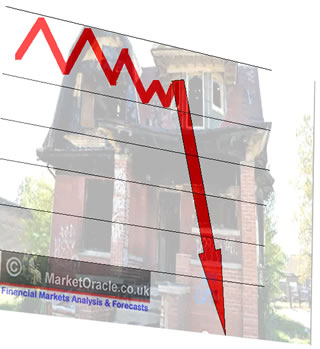The Recession Is Far From Over
Economics / Recession 2008 - 2010 Jun 17, 2009 - 07:53 AM GMT Claus Vogt writes: The crisis is over, or nearly so, say Wall Street and the huge majority of bulls. All those economists, central bankers and analysts, who didn’t see this crisis coming and who underestimated its severity all the way down, are sure that the worst is over now.
Claus Vogt writes: The crisis is over, or nearly so, say Wall Street and the huge majority of bulls. All those economists, central bankers and analysts, who didn’t see this crisis coming and who underestimated its severity all the way down, are sure that the worst is over now.
Should you believe them?
All these “green shoots” as of late may turn out to be harbingers of a trend change for the better in the economy. That’s indeed a possibility. Or they may just be a passing flare as were similar developments during the 1930s. This latter scenario is much more probable. Let’s look at why …
The U.S. Labor Market Is Still Very Weak
Nonfarm payrolls for May fell by 345,000. This was considerably better than the expected loss of 520,000. And it was much better than in April (-504,000), March (-652,000), February (-681,000), and January (-741,000). The bulls took this latest figure as a sure sign of an impending end of the recession.
 |
| May’s job-loss number sure as heck isn’t worth cheering over. |
Not so fast …
First, 345,000 lost jobs are nothing to brag about. Just because there were more job losses in the months before doesn’t turn it into good news. History agrees: Looking back at the worst point of the 2001 recession, payrolls shrank by 325,000. And this was right after 9/11. In the 1990/91 recession the worst payroll figure came in with a loss of 306,000. So the latest number sure as heck isn’t worth cheering over.
Second, the Bureau of Labor Statistics (BLS) uses a model to estimate what may be going on in those parts of the labor market where the statisticians do not get data. This Birth/Death Adjustment Model pertains to small and new corporations in 10 non-farm supersectors, including leisure and hospitality.
This model said 220,000 new jobs were added in May.
In fact, the BLS even assumed that 7,000 financial service jobs and 43,000 construction jobs were created. This is highly unlikely because in the other part of the BLS report, where real data are available, both sectors showed job losses of 89,000. This discrepancy does not make any sense whatsoever!
And interestingly, this dubious plug factor has grown by 27 percent year-over-year.
The problem is that the Birth/Death figure cannot be verified since it was modeled. If we assume it’s bogus, 565,000 jobs were actually lost in May!
Third, there is another important statistic pertaining to the condition of the labor market: Aggregate-hours worked. This index fell 0.7 percent in May after a 0.3 percent drop in April. So there’s definitely no “green shoot” there.
Fourth, the unemployment rate rose to 9.4 percent in May, up from 8.9 percent in April. In a garden variety recession the unemployment rate is a lagging indicator. But not so in a post-bubble economy where debt problems are the major drivers of the down turn. Furthermore, unemployment has a big influence on mortgage and consumer delinquency rates.
Where Will A Recovery Come From?
Again, this is not a garden variety recession. The current problems stemming from a burst real estate bubble, over indebtedness and huge wealth destruction are much bigger than typical concomitants of recessions. The longevity of typical post-bubble problems argues strongly against a quick recovery.
 |
| Don’t expect a pent up demand for housing to lead us out of the recession. |
To end recessions and lead the way to recovery there have been three typical developments:
- Pent up demand for housing led to a strong revival of the real estate market and invigorated construction. Don’t expect this to happen right after the country’s largest real estate bubble burst. Pent up demand for automobiles played another important role in digging the economy out of a recession. This time around, though, the U.S. auto industry is in shatters.
- After short recessionary dips, consumption reemerged strongly by means of surging consumer credit balances. Now the saving rate is surging, and demographics argue strongly that this is just the beginning of a long-term trend.
Yes, the economy isn’t contracting as much as it was a few months ago. But the probability of this “less bad” economy evolving into a recovery is very low.
The stock market has already fully embraced the strong recovery scenario. However, “less bad” has to turn into something “really good” soon. Otherwise a huge disappointment will suck the stock market down the drain.
Best wishes,
Claus
This investment news is brought to you by Money and Markets . Money and Markets is a free daily investment newsletter from Martin D. Weiss and Weiss Research analysts offering the latest investing news and financial insights for the stock market, including tips and advice on investing in gold, energy and oil. Dr. Weiss is a leader in the fields of investing, interest rates, financial safety and economic forecasting. To view archives or subscribe, visit http://www.moneyandmarkets.com .
Money and Markets Archive |
© 2005-2022 http://www.MarketOracle.co.uk - The Market Oracle is a FREE Daily Financial Markets Analysis & Forecasting online publication.



